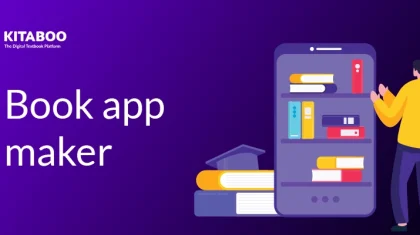
KITABOO seamlessly integrates with Moodle to deliver high-end content
Summarize this blog with your favorite AI:
Developed by Martin Dougiamas in 2002, Moodle is an acronym for Modular Object-Oriented Dynamic Learning Environment. The Moodle LMS is today amongst the most popular learning management systems used in higher education and the corporate world to deliver learning, development, and training initiatives. The popularity of Moodle lies in the fact that it is flexible, open source, and free to download. This means that you can run, share, study and modify the platform to your unique needs.
What is Moodle?
As of date, the Moodle LMS has had over 100,000 implementations worldwide and is used by over 160 million learners. There is a lot that you can do with a Moodle LMS. You can create classes and attendance lists, deliver learning modules, give assessments and provide feedback, and much more. The LMS is very flexible and highly configurable requiring very little professional help to set it up and running. Like other LMSs, Moodle LMS is a cloud-based system necessitating users to register and authenticate themselves and then access courses and other material from anywhere and anytime using an Internet-enabled device.
What are the benefits of integrating Moodle with KITABOO?
KITABOO is a leading digital publishing and content delivery platform from Hurix Digital. Trusted by several reputed publishers, academic institutions, and corporate houses across the globe, it has more than 15 million users and growing to its credit. Backed by a combination of exciting eBooks and powerful features and tools, KITABOO facilitates a learning environment that is highly engaging, immersive, and entertaining. KITABOO is a one-stop shop to enhance and deliver an amazing digital learning experience for teachers and learners, securely, and at scale. Higher education institutions and corporate organizations are increasingly employing a learning management system to create, deploy and deliver online or blended courses. The LMS facilitates classroom learning, online learning, and blended learning. It also provides communication and collaboration tools, allowing instructors and learners to collaborate and work together as teams.
The integration between KITABOO and Moodle takes content development and delivery to a whole new level. Users can benefit from the synergies of both platforms. KITABOO uses its own technology, oneRoster, to integrate with Moodle LMS to securely access roster information from its end-users, that is, educational institutions and corporate houses. It can easily integrate with the institute’s existing student information system and tools such as attendance tools and grade books. Once the syncing is complete, teachers, students, and administrators can sign into KITABOO and access its resources without worrying about separate login credentials. Here are some benefits of the integration between KITABOO and Moodle.
White-label your content: KITABOO is a fully customizable white-label LMS with perpetual IPR, based on open-source robust Moodle-based architecture. It can easily integrate with third-party tools and external systems, such as Moodle LMS, allowing clients to fully customize and white-label the LMS to reflect and build their brand identity.
Anytime and anywhere access to learning resources: KITABOO offers anytime and anywhere access via a robust mobile app. With a single sign-in, you can access both Moodle LMS and KITABOO on your mobile, laptop, or any other reading device.
Benefit from blended learning: Both KITABOO and Moodle enable a blended approach to education. Learners can gain from the best of both worlds – offline interaction with the instructor and peers, and access to a wealth of online resources.
Create personalized learning environments: The KITABOO and Moodle integration supports personalized learning experiences, with and without the interaction and collaboration with peers and instructors. KITABOO can further be integrated with third-party apps such as WebEx and Skype for live video conversations.
Leverage powerful AI-driven tools: Instructors can leverage the powerful features of Moodle LMS and KITABOO to automate major tasks and thus have more time at hand to interact with the learners. For instance, they can leverage the AI-driven tools of KITABOO to collate material on a particular subject from different eBooks into one document. Instructors are thus spared the task of creating notes manually and use this time to interact with the learners.
Monitor real-time progress: Instructors can track in real-time students’ progress during the course of a lesson, and provide feedback using a comprehensive set of tools. Further, they can also respond to their work, using automated assessment tools, fed on pre-defined criteria.
Create microlearning content: Both KITABOO and Moodle LMS allow you to create micro-learning content for ease of access on all device types including the smartphone. Microlearning content is concise in nature usually in the form of audio or video, or bulleted lists covering the main points of a lesson. Apart from micro-learning content, you can also create and deliver long-form content in a virtual environment.
Peer and self-assessment: Both KITABOO and Moodle LMS support both pre-tests and post-tests, integral to assessing learners’ progress. With their flexible testing features, instructors can automatically mark learners’ progress based on pre-set criteria and also store their complete assessment portfolio. The learners can also gauge their own progress and course correct towards the learning outcomes.
Security: Last but not the least, KITABOO creates DRM-protected content, ensuring the confidentiality of your digital assets. The single secure sign-in feature prevents unauthorized data access to maintain data integrity at all times.
In Conclusion
The KITABOO and Moodle LMS integration seek to enhance the teaching and learning experience, making it more relevant, contextual, engaging, and immersive. At the same time, the powerful features of both the platforms help to ease the workload of the instructors and students, enabling them to spend time on the actual learning experience itself.
Both KITABOO and Moodle LMS support plug-and-play capabilities. With these plugins, you can seamlessly perform all administrative functions, collaborate across geographies, deliver remote education and at the same time, make learning collaborative, engaging, and fun.
KITABOO is empowered with the latest digital technologies allowing you to create gamified content with branching scenarios and interactive scenarios to support active learning strategies such as case-based learning and roleplaying. It is a fully customizable white-label LMS with perpetual IPR, which means that you can use it to match your unique training workflow. You don’t need to install, maintain or upgrade your existing processes or technology – simply subscribe to this license-based, cloud-based SaaS model and get your training calendar rolling.
In sum, KITABOO integration with Moodle greatly enhances content creation and delivery. Besides, you also benefit from comprehensive maintenance and support services from Hurix Digital to ensure a hassle-free experience.
Contact our expert team now and get started!
To know more, please write to us at contact@web-staging.kitaboo.com
Suggested Reads:
Discover how a mobile-first training platform can help your organization.
KITABOO is a cloud-based platform to create, deliver & track mobile-first interactive training content.



